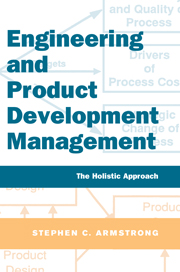Book contents
- Frontmatter
- Contents
- List of figures and tables
- Forewords
- Preface
- Acknowledgments
- Layout of book at a glance
- PART 1 UNDERSTANDING ENGINEERING PROCESS MANAGEMENT
- 1 The holistic approach to managing engineering operations
- 2 An overview of engineering process management
- 3 Organization of engineering tasks
- PART 2 APPLYING ENGINEERING PROCESSES TO PROGRAM MANAGEMENT
- PART 3 DEPLOYING ENGINEERING PROCESS MANAGEMENT
- PART 4 APPENDIXES
- Glossary
- References
- Index
1 - The holistic approach to managing engineering operations
Published online by Cambridge University Press: 05 April 2014
- Frontmatter
- Contents
- List of figures and tables
- Forewords
- Preface
- Acknowledgments
- Layout of book at a glance
- PART 1 UNDERSTANDING ENGINEERING PROCESS MANAGEMENT
- 1 The holistic approach to managing engineering operations
- 2 An overview of engineering process management
- 3 Organization of engineering tasks
- PART 2 APPLYING ENGINEERING PROCESSES TO PROGRAM MANAGEMENT
- PART 3 DEPLOYING ENGINEERING PROCESS MANAGEMENT
- PART 4 APPENDIXES
- Glossary
- References
- Index
Summary
This book is intended to help you implement a more rigourous approach to the practice of engineering management. In our consulting work, we have seen many attempts to improve this management process. Mostly we have been called in when previous initiatives have failed. We believe that these initiatives have failed for one simple reason. They were narrow, one-dimensional solutions to problems that had many facets. Additionally, the people who offered the consulting services quite often had very little practical background in engineering. In this book, we will look at the engineering process from a holistic approach.
Typically, we see the scenario play out as follows: a firm finds that its development projects are taking too long or costing too much money to complete. A senior manager in engineering has read a book, attended a course, or acquired considerable experience in one particular approach and recommends that the organization simply implement this new way and the problem will be solved. In the best case, a year later the performance in the one area at which the solution was aimed has improved, but there is no broad-based financial measure of improvement. In the worst case, the organization is in upheaval with pockets of resistance firmly entrenched against the change.
The reason for this failure is the application of improved methods in isolation from one another. These solutions typically originate from one of six bodies of knowledge.
- Type
- Chapter
- Information
- Engineering and Product Development ManagementThe Holistic Approach, pp. 3 - 23Publisher: Cambridge University PressPrint publication year: 2001

